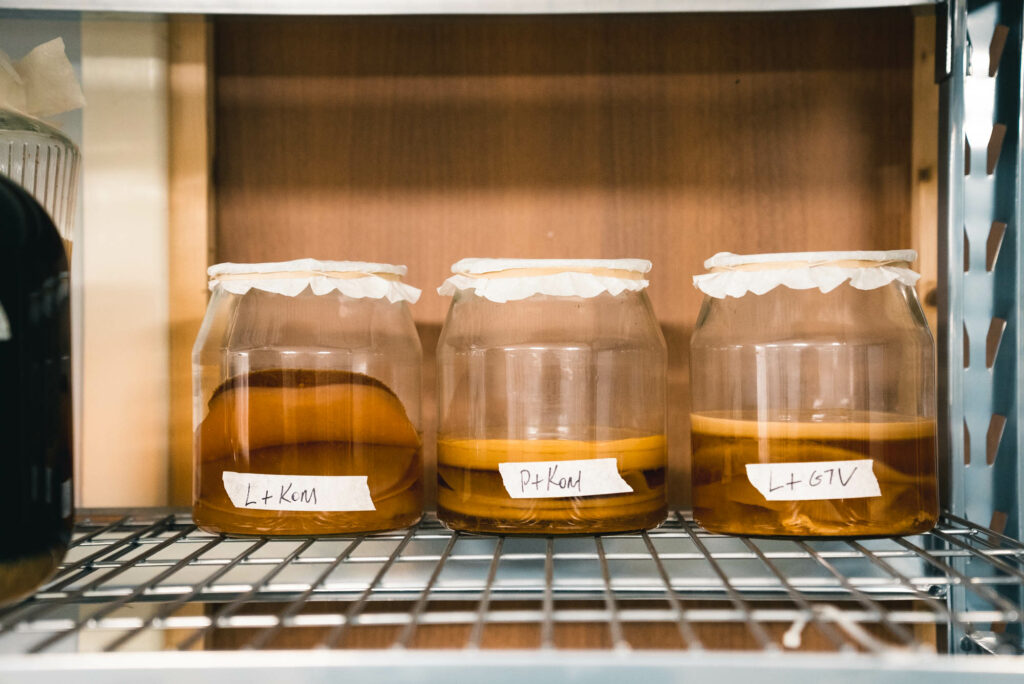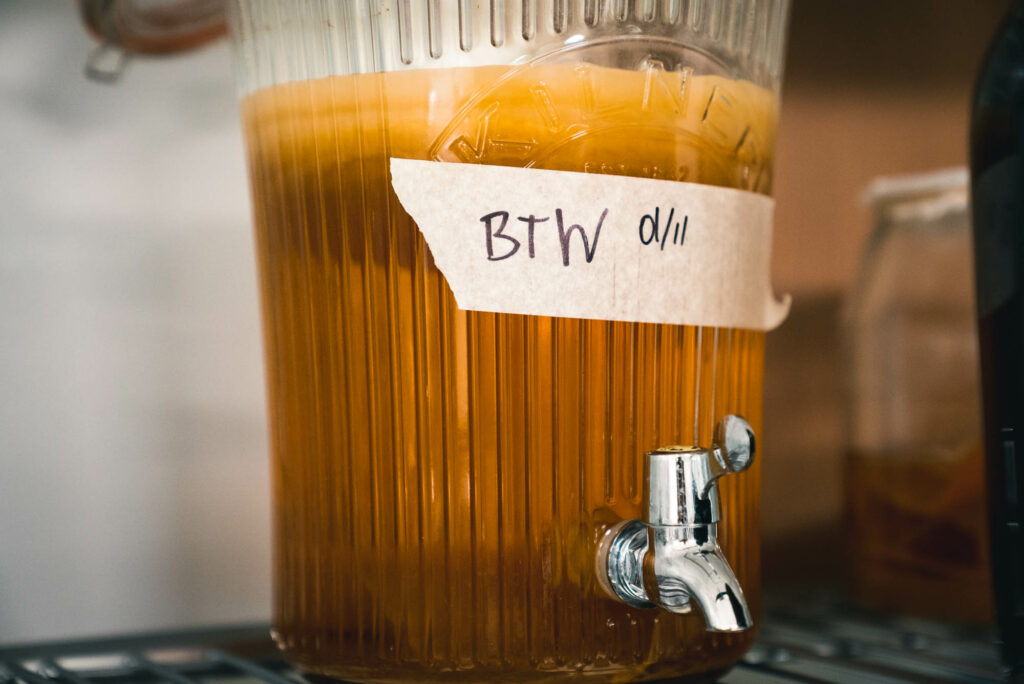Kombucha is a delicious, tangy beverage that has been popular for centuries. It’s a great way to bring flavour and health benefits to an easy to make beverage. But did you know that you can make it easily at home? This blog post will cover how it is made, where to get ingredients for brewing, and what equipment is needed to make. Read on to learn more about how to make kombucha!
The Ingredients
When brewing kombucha, you’ll need the right ingredients to get the process going. The key ingredients are tea, sugar, a SCOBY (symbiotic culture of bacteria and yeast), and a starter liquid. You can purchase tea bags or loose-leaf tea, brewing sugar, and a kombucha starter kit from Geterbrewed.
The tea will provide the caffeine and antioxidants for your kombucha, while the sugar helps to feed the yeast and bacteria that live in the SCOBY. Starter liquid gives your brew a healthy dose of existing kombucha cultures so it can get off to a good start.
Kombucha is created through fermentation when microorganisms like yeast and bacteria break down the sugars into alcohol and carbon dioxide. This process creates a unique flavour and effervescence in your kombucha and releases beneficial acids like acetic acid and gluconic acid that can help with digestion and detoxification. Once these ingredients are assembled, you’re ready to begin the fermentation process.

The Equipment
The equipment needed to make it is really simple, its usually a glass wide mouthed vessel. The cover can be a piece of muslin cloth or coffee filter with an elastic band. See picture above
Fermenter
The first piece of equipment you need is a large fermentation vessel. Depending on the size of the batches you want to make, your vessel should be able to accommodate the desired amount. You should also consider the vessel’s shape, as the sides and bottom should be non-porous and impermeable. Do not use plastic fermenters.
Brewing
A brewing vessel will be needed to make the tea. Again this will depend on the amount you want to make. Luckly you don’t need to extract sugars from malt, which is needed for beer production. This means the brew time is drastically reduced. If using loose tea, you will want a filter system in place. You might also want to consider a hot water tank. This will be used for preheating the water before brewing. The type of tea and the temperature you produce the tea at will have an impact on the flavour, checkout our video with a local commercial Kombucha brewer for some tips.
Carbonation and Packing
If you want to carbonate your beverage, you may want to invest in a carbonation system using corny kegs and co2. In addition to the fermentation vessel, you will need a thermometer and pH reader to ensure that the temperature and acidity levels remain constant throughout the brewing process. You will also need bottles or cans for packaging and a funnel and mesh strainer for pouring the liquid into the bottles.
Other
Finally, you should also consider how kombucha works. It relies on a symbiotic culture of bacteria and yeast (known as SCOBY) to produce its acidic, fizzy beverage. You will need to source a healthy SCOBY from a reputable online vendor or a local home brewer. It’s crucial to ensure that your SCOBY is organic and free from contaminants.
These are just some items you’ll need when setting up your kombucha brewing operation. With the right equipment and knowledge about how it works, you can start brewing delicious batches that are sure to be popular with health-conscious customers.
The Process
Brewing kombucha can be a time-intensive process, but with the proper preparation and dedication, it can be a rewarding endeavour.
It begins with the SCOBY, essential for turning sweet tea into a tart, fizzy kombucha. The SCOBY is added to sweetened tea and starter liquid from a previous batch of kombucha and left to ferment for about seven to 14 days. During this time, the bacteria and yeast convert the tea’s sugar into alcohol, giving kombucha its signature tangy taste.
Once the kombucha has finished fermenting, it is packaged and allowed to sit at room temperature for an additional one to three weeks before it is ready to drink. During this second fermentation, the remaining sugar in the kombucha is converted into carbon dioxide, giving the beverage its effervescent quality.

The Benefits of kombucha
Kombucha is an ancient drink that has been enjoyed for centuries and is becoming increasingly popular in modern times. It is made from fermented tea, which means it is a probiotic beverage that can help support your gut health. This makes kombucha a powerful drink for boosting your immunity and overall health. But what are the exact benefits of kombucha, and why should you include it in your diet?
Kombucha is packed with beneficial compounds such as antioxidants, amino acids, and probiotics. The unique combination of these compounds means kombucha can provide various health benefits. From boosting energy levels to helping improve digestion. Antioxidants are important for reducing inflammation in the body, while amino acids help to repair muscle tissue and aid in proper digestion. Probiotics, on the other hand, help to balance the bacteria in your gut. This can help reduce digestive issues, such as bloating, gas, and constipation.
Kombucha also contains various vitamins and minerals that help boost your energy levels. Vitamin B-12, for example, helps maintain red blood cells and ensures you get the energy you need. Vitamin C can help protect against infections, while zinc and iron can help promote healthy cell growth.
In addition to its health benefits, many people enjoy the taste of kombucha more than traditional tea. Its sweet yet tangy flavour makes it a refreshing alternative to sugary soft drinks. It is also low in sugar and calories, making it an excellent choice for those looking to watch their weight.
What is Kombucha Good For?
Overall, it is a great way to add some beneficial vitamins and minerals to your diet while providing a delicious and refreshing drink. So, if you are wondering how kombucha works or if the drinks are healthy, the answer is a resounding yes! Kombucha has a range of health benefits, so it’s worth giving it a try. From improving digestion to boosting energy levels, kombucha could be just what you need to stay healthy and fit.
- It can help support overall health and well-being.
- Reported to help them improve digestion, reduce fatigue, and boost the immune system.
- Studies have shown that kombucha can help to improve digestive health, support weight loss, and lower cholesterol levels.
- Anti-inflammatory properties can also be beneficial for reducing symptoms associated with certain medical conditions, such as arthritis and asthma.
- Contains several key vitamins and minerals such as iron, vitamin C, and B vitamins.
- Contains probiotics, antioxidants, amino acids, enzymes, and beneficial bacteria.
- A healthy alternative to carbonated sodas.
In conclusion
Kombucha has become a popular health trend due to its potential benefits. While the exact benefits are still being studied, we know that it is good for gut health, can boost the immune system, and is an excellent source of vitamins. Kombucha is incredibly versatile, and with the right ingredients and equipment, it’s easy to make it. So why not give it a try and see what all the buzz is about?